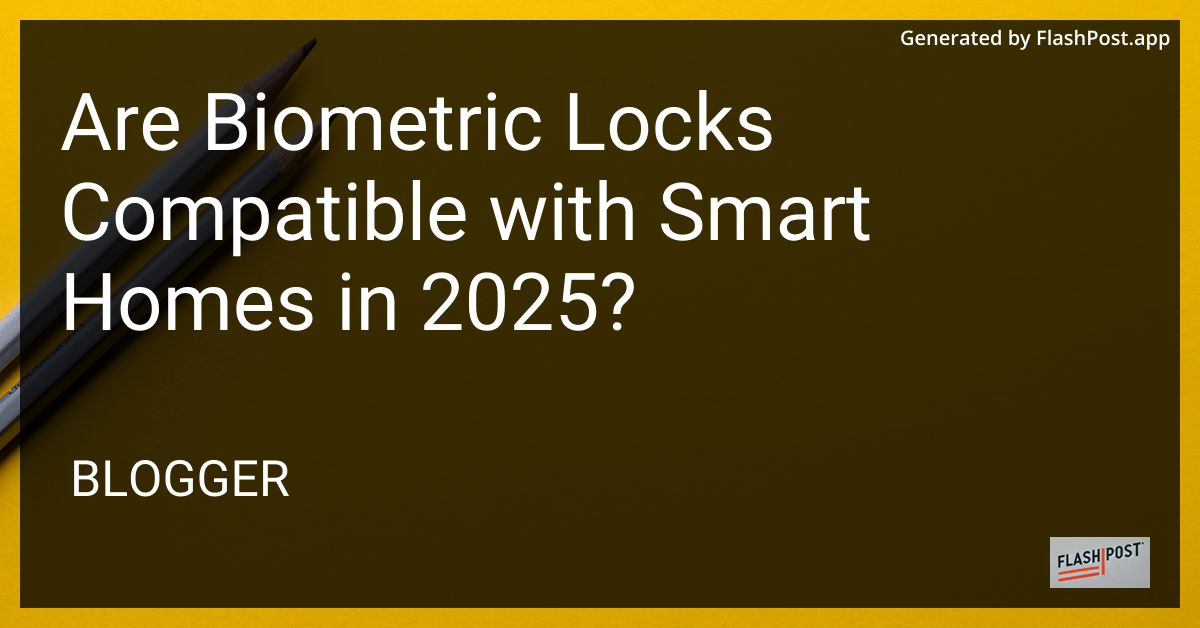Are Biometric Locks Compatible with Smart Homes in 2025?

Are Biometric Locks Compatible with Smart Homes in 2025?
As smart homes become the norm, integrating various technologies for convenience, security, and efficiency is essential. One such innovation making waves is the biometric lock. But the pressing question on every homeowner’s mind is: Are biometric locks compatible with smart homes in 2025?
The Rise of Smart Homes
Smart homes have transitioned from futuristic concepts to commonplace realities within just a few years. These homes utilize advanced systems to control lighting, heating, security, and other functions remotely. With smart technology evolving rapidly, biometric locks are increasingly being considered to heighten security levels.
What Are Biometric Locks?
Biometric locks are security devices that use an individual’s unique physical characteristics, such as fingerprints, facial recognition, or retina scans, for identification. Unlike traditional locks, they offer enhanced security since they rely on personal physical traits that are difficult to replicate or steal.
Compatibility with Smart Homes
Biometric locks are designed to integrate seamlessly into smart home systems. Here’s why they are expected to be highly compatible in 2025:
1. Advanced Integration Technologies
Modern smart home systems employ advanced technologies that allow for easy integration of new devices. Biometric locks can connect with home automation systems via Wi-Fi, Bluetooth, or other protocols, enabling homeowners to manage their locks remotely through smartphone apps or voice assistants.
2. Enhanced Security Features
Biometric locks provide an additional layer of protection compared to traditional locks. In smart homes, security is paramount, and these locks can be programmed to interact with other security measures, such as surveillance systems and alarms. This interoperability ensures that any security breach can be promptly addressed.
3. User-Friendly Interfaces
The interface of biometric locks has evolved to become more intuitive and user-friendly, matching the overall ease of use seen in smart homes. This aligns with the preference for technology that simplifies daily life rather than complicating it.
4. Scalability and Future-Proofing
As technology advances, biometric locks are likely to grow in features and connectivity. They can be updated to remain compatible with evolving smart home systems, ensuring they remain relevant and functional over time.
Considerations for Homeowners
While biometric locks are promising, homeowners should consider:
- Privacy Concerns: As with any technology collecting personal data, it’s crucial to understand how your data is being used and stored.
- Cost: While prices are decreasing as technology matures, biometric locks may still represent a more significant investment than traditional locks.
- Maintenance: It’s essential to maintain biometric systems to ensure consistent performance and security.
Conclusion
As we move into 2025, biometric locks are poised to be an integral part of the smart home ecosystem. Their compatibility with smart home systems offers robust security, convenience, and peace of mind for homeowners. For those passionate about enhancing their home’s security and technology integration, biometric locks represent a valuable investment.
Explore other cutting-edge home solutions like affordable home sauna deals or discover why a Santoku knife is perfect for home cooking advancements.
Embrace the future with technology that caters to your lifestyle needs and taste.
Comments
Post a Comment